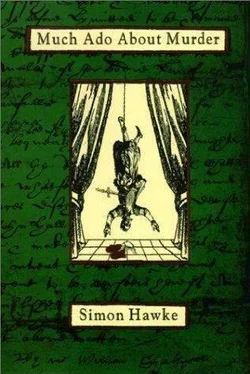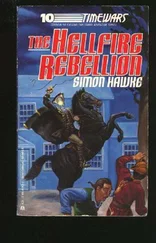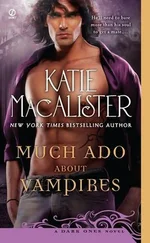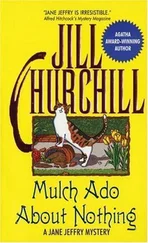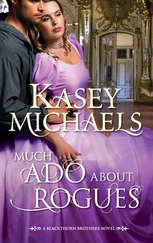Simon Hawke - Much Ado About Murder
Здесь есть возможность читать онлайн «Simon Hawke - Much Ado About Murder» весь текст электронной книги совершенно бесплатно (целиком полную версию без сокращений). В некоторых случаях можно слушать аудио, скачать через торрент в формате fb2 и присутствует краткое содержание. Жанр: Исторический детектив, на английском языке. Описание произведения, (предисловие) а так же отзывы посетителей доступны на портале библиотеки ЛибКат.
- Название:Much Ado About Murder
- Автор:
- Жанр:
- Год:неизвестен
- ISBN:нет данных
- Рейтинг книги:5 / 5. Голосов: 1
-
Избранное:Добавить в избранное
- Отзывы:
-
Ваша оценка:
- 100
- 1
- 2
- 3
- 4
- 5
Much Ado About Murder: краткое содержание, описание и аннотация
Предлагаем к чтению аннотацию, описание, краткое содержание или предисловие (зависит от того, что написал сам автор книги «Much Ado About Murder»). Если вы не нашли необходимую информацию о книге — напишите в комментариях, мы постараемся отыскать её.
Much Ado About Murder — читать онлайн бесплатно полную книгу (весь текст) целиком
Ниже представлен текст книги, разбитый по страницам. Система сохранения места последней прочитанной страницы, позволяет с удобством читать онлайн бесплатно книгу «Much Ado About Murder», без необходимости каждый раз заново искать на чём Вы остановились. Поставьте закладку, и сможете в любой момент перейти на страницу, на которой закончили чтение.
Интервал:
Закладка:
“If a man likes his work, why should he not sing? Good, hard work is its own song, if you ask me. But why all this sudden interest in my taste in entertainments?”
“I was simply curious, is all,” said Smythe, with a shrug. “You love what you do. It makes you want to sing. Well, that is how working at the Theatre often makes me feel, although I do not have a voice as fine as yours. When I sing, I fear it sounds like geese farting in the wind. But I do it, so long as it does not greatly grate upon the ears of those nearby.”
“Aye, well, if it makes you happy, then that is all that truly matters, I suppose,” said Bailey, “though for the life of me, I cannot see why a fine, strong lad like you would wish to waste his time with a mincing flock of poppinjays. Here, hand me those tongs…”
The quenching fire hissed and steamed as the red-hot iron was plunged into it.
“Now you take something like a piece of steel,” said Bailey. “It has substance, value, worth. ‘Tis useful, and when made right, by a good craftsman, it can be a thing of beauty. You have that gift, boy. This knife you made for me…”
He took the blade out of its sheath and gazed at it fondly. “A simple thing, really, no embellishments, no fancy decorations or engraving, no wire wrapping, just simple staghorn for the hilt… ‘Tis a good, honest, working man’s knife. And yet, you have made of it a thing of beauty.”
“I merely made it as my Uncle Thomas taught me,” Smythe said, though he was pleased by the compliment, coming from a man who knew his steel.
“Do you know that I have had nearly a dozen requests already for ones just like it?” Bailey asked.
“You have?” Smythe said, with surprise. “From who?”
“From my customers,” said Bailey. “Each one of them a craftsman in his own right, mind, men who know good work when they see it. And even though you are still unseasoned, yours is more than merely good. ‘Tis fine work, indeed. Any man who knows can see that.”
“Well…” Smythe said, somewhat sheepisly. He was a bit taken aback. “I do not quite know what to say to that.”
“Say that you shall make them, and I shall take the orders,” Bailey said. He drew the quenched steel from the fire. “You can start with this. I am not saying you should leave your mincing players,” he added, wryly, “but as you know only too well, the playhouses are still closed, and I know you need the money.”
“There is word that they may reopen again soon,” said Smythe.
“And then again, they may not. If so, then you will have some honest work that honest men may then appreciate. And if the playhouses do reopen, why then, you may work here on the knives whenever you can find the time. My customers shall wait. They know that good work is worth waiting for.”
Smythe looked at him. “I see what you are trying to do, Liam.”
The smith looked back at him directly. “I am trying to please my customers and make us both some money in the bargain. If you prefer to act out silly daydreams on the stage, that is your business and none o’ my concern. To each his own, I say. But I can offer you no work as a player, Tuck. This is the work I have. You either want it, or you do not. The choice is yours.”
“I do need the work, Liam,” Smythe replied. “And I did not intend to sound ungrateful. Forgive me. You have been naught but kind to me and ‘tis not my place to go putting on airs.”
“Aah, I would never say you had done that,” said Bailey. “You’re a good lad, Tuck, an’ you have a place here anytime you wish. Now, you get to working on those knives, eh? That should keep you busy for a while.”
Later on that afternoon, just as Smythe was getting ready to leave Liam Bailey’s smithy for the playhouse, Ben Dickens stopped by.
“Why, Ben! I did not expect to see you here,” said Smythe. “What errand brings you?”
“I was coming to see you,” Dickens replied. “I recalled you spoke of picking up some work here and, since ‘twas on my way, I thought I might stop by on my way to the Theatre and walk with you. That is, of course, if you do not spurn my company?”
“Not at all,” said Smythe. “You are most welcome, Ben. Liam, do you know Ben Dickens?”
“Dickens…” Bailey furrowed his brow thoughtfully, staring at him with a vague glimmer of recognition. “You look familiar…”
“I was once apprentice to Master Moryson, the armorer,” said Dickens. “You may remember me, sir.”
“Ah. Indeed, I do remember you,” Bailey said gruffly, with a frown. “You gave up a perfectly good trade to go off and be a soldier. Damned foolishness.”
“Aye, well, perhaps, but it seemed like a good idea at the time,” said Dickens, lightly.
“So now yer back, then?”
“So ‘twould seem.”
“For how long this time?” the old smith asked, sourly.
“For good, I hope,” said Dickens. “That is, for good or ill, I have returned to England, but ‘tis my hope that ‘twill be for good.”
Bailey frowned and grunted, then turned his back upon them and resumed his work.
“Come on, Ben,” Smythe said, taking off his apron and hanging it up on its hook, anxious to be off before Dickens irritated Bailey any further. “Good night to you, Liam. I shall return upon the morn.”
“Suit yourself,” said the smith, without turning around.
Dickens chuckled as they left. “Sour as a green apple, is he not?” he said as they stepped out into the street.
“ ‘Tis just his way,” said Smythe. “Liam Bailey is a good man. He is honest and good-hearted.”
“I know he is,” Dickens replied. “My old master would never have had aught to do with him else. But unlike a green apple, Bailey sours even further as he ripens. He does not approve of me, I fear.”
“He seems like that to everyone,” Smythe replied. “Besides, methinks he does not truly know you.”
“Nay, he knows all he needs to know, or else thinks he needs to know,” said Dickens, good-naturedly, “and that is that I left a good apprenticeship to become a mercenary soldier. And for that sort of ‘damned foolishness,’ as he called it himself, I do not think that Liam Bailey could ever forgive anyone, least of all an ungrateful apprentice who left the service of a friend of his.”
“I have never heard him speak of your Master Moryson,” said Smythe. “What became of him? Does he still pursue his craft?”
“He died,” said Dickens. The joviality left his tone. “He fell to the sweating sickness the year after I left.”
“I am sorry,” Smythe said.
“So am I,” said Dickens. “He was a good man, and a fair master. He taught me much. Bailey was right, you know. ‘Twas ungrateful of me to have left him.”
“You did what you felt you had to do,” said Smythe. “You wanted adventure, and you knew that you would never find it working in an armorer’s shop.”
“True,” Dickens agreed. “I did want adventure. Very much so. And I found it. Very much so. And now, looking back on it all, I am sorry that I ever left.”
“Was it so bad then?”
Dickens shrugged. “‘Twas all very different from what I had expected. But then, enough of that. I should not wish to have you thinking ‘tis my wont to wallow in melancholy. As I have said before, had I known then what I now know, methinks I would have made some different choices, but there is little to be served in regreting what is past.”
“Indeed,” said Smythe. “There is much to be said for looking forward.”
Dickens smiled. “And to what do you look forward, Tuck?”
“At the moment, I merely look forward to the playhouses opening once more,” said Smythe. “S’trewth, we all desperately need the money. And not all the players are able to find other work, as I have been fortunate to do.”
Читать дальшеИнтервал:
Закладка:
Похожие книги на «Much Ado About Murder»
Представляем Вашему вниманию похожие книги на «Much Ado About Murder» списком для выбора. Мы отобрали схожую по названию и смыслу литературу в надежде предоставить читателям больше вариантов отыскать новые, интересные, ещё непрочитанные произведения.
Обсуждение, отзывы о книге «Much Ado About Murder» и просто собственные мнения читателей. Оставьте ваши комментарии, напишите, что Вы думаете о произведении, его смысле или главных героях. Укажите что конкретно понравилось, а что нет, и почему Вы так считаете.
